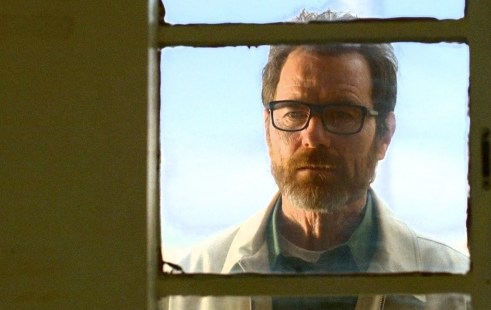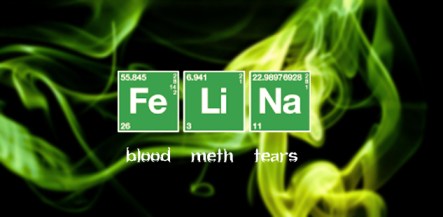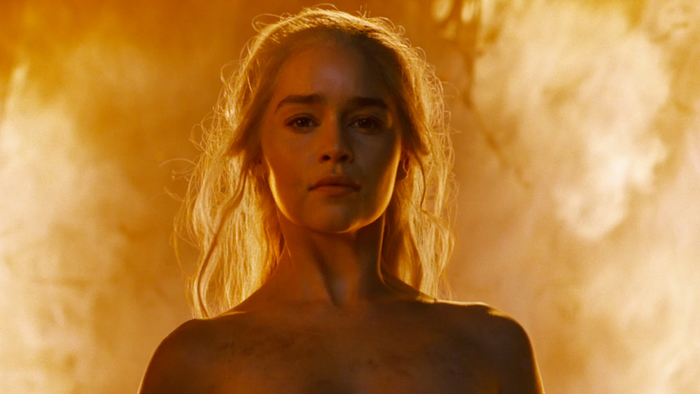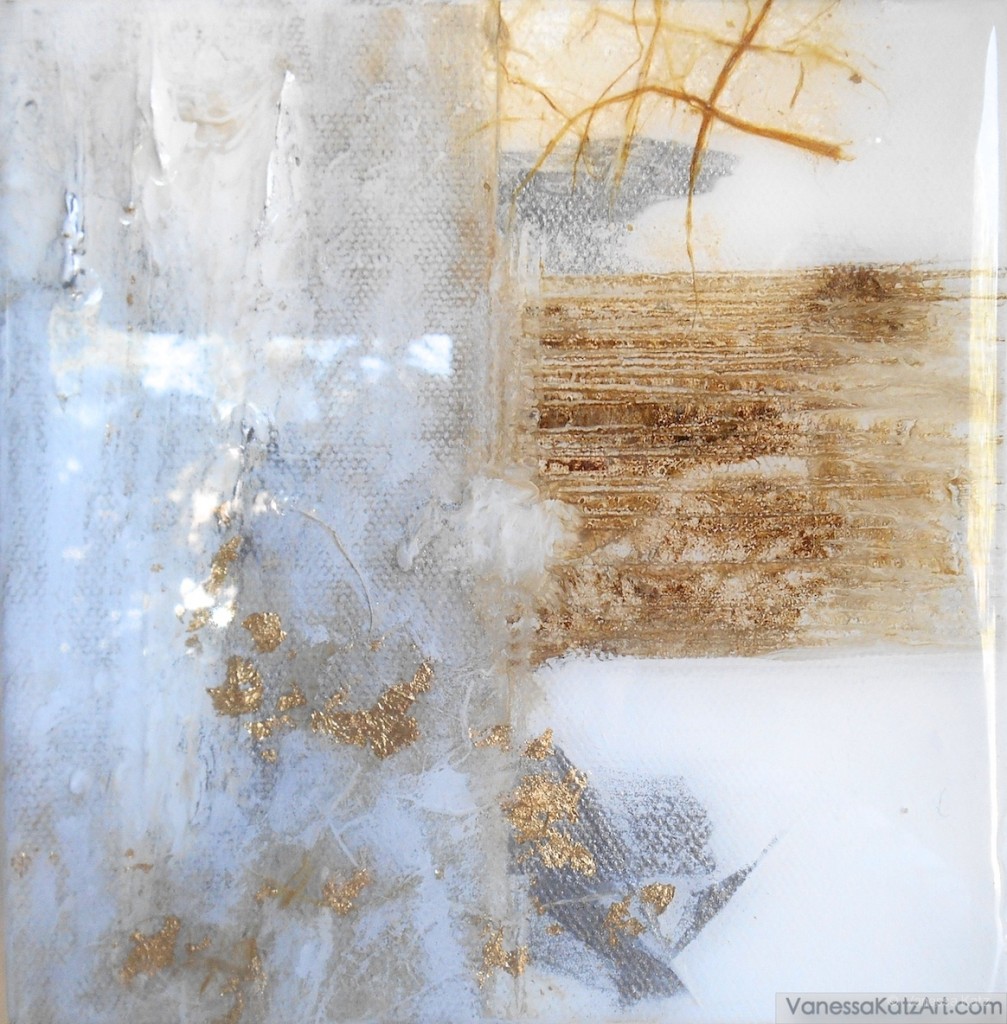With “Felina” comes the epic conclusion of Breaking Bad, but Walt still has one final ride for us embark upon….
“Cheer up beautiful people, this is where you get to make it right.” – Walter White
by: Michael Shields
It was here, in “Felina” ((An allude to the word finale, as well as the obsessed subject of the song we hear in the car Walt steals to begin the episode, Marty Robbins “El Paso”. Obsession – a fitting tribute to Walt’s love affair with the product which grew his empire.)) the final episode of the concluding season of Breaking Bad, where Walter White took us on one more ride. Along we went as Walt hatched his final scheme to achieve some measure of redemption for all his sins. Of course, he would never be able to make things whole, but he was capable of making things as right as they possibly could be. It was here, in this final chapter, where we received a gratifying cherry on top of this masterpiece of a saga, an epic tale that concluded with its protagonist setting off for home in an attempt to rebuild all that his actions have torn down. We all braced for the worst, but when the dust finally cleared we weren’t feeling all that bad. Like Walt, in response to Skyler noting obviously that Walt looked terrible, we actually felt “good.”
“Felina” moved deliberately. It smoothly sailed with no apparent sense of urgency, but before you knew it the pieces were starting to fit together brilliantly. And that all began with the money. For Walt, devising a method to get his children his fortunes was beginning to seem inconceivable, especially in light of Flynn triumphantly slamming the door shut on his last ditch effort to pay it forward. Yet, it seemed that the Charlie Rose interview at the apex of “Granite State” meant more to Walt than we even thought. It incited an idea, a method to ensure that the “blameless victims of their monstrous father” were set for life. And in doing so Elliot and Gretchen were given the opportunity for some atonement of their own ((It is remarkable how much Walt sounds like Mike when he coldly states “Elliot, if we are going to go that way, you’re going to need a bigger knife.”)), albeit under the direct threat of violence from “the two best hitman west of the Mississippi.” ((I find it brilliant that Walt uses his own legend to intimidate people at this point, and even more impressive is that Vince found a way to write Skinny Pete and Badger into the finale. Bravo.)) With assurance that Walt Jr. and Holly would be taken care of, you inevitably and surprisingly were struck with the feeling that the gut-wrenching pain that encompassed the second half of season 5 may well be behind us. That we had passed rock bottom and from here we could only rise back up. It was a good feeling, and too long for this world, shattering the moment we revisited Jesse in captivity.
 Although brief, one of the most affecting scenes of the episode was Jesse’s flashback to his happy place. Jesse, always the artist, finds solace in the crafting of the perfect wooden box ((A reference to his earlier days in therapy – “Kafkaesque.” A box he built and sold for an ounce of weed instead of giving it to his mother.)). Birthing into the world something that didn’t exist before, something beautiful, and feeling fully satisfied upon its completion means something to Jesse. The woodworking scene revealed to us Jesse’s bliss, his ultimate paradise. It was beautiful, and warm, and a perfect contradiction to the living hell he awakens into with a jerk of the chain. Being thrust back into the nightmare of Jesse’s perpetual servitude was a jaunting wake up call, a reminder of how implausibly he continues to suffer. It was the ultimate homage to the credence of true justice that Jesse was able to choke the life from his psychopathic captor, the man who stole Andrea from his world.
Although brief, one of the most affecting scenes of the episode was Jesse’s flashback to his happy place. Jesse, always the artist, finds solace in the crafting of the perfect wooden box ((A reference to his earlier days in therapy – “Kafkaesque.” A box he built and sold for an ounce of weed instead of giving it to his mother.)). Birthing into the world something that didn’t exist before, something beautiful, and feeling fully satisfied upon its completion means something to Jesse. The woodworking scene revealed to us Jesse’s bliss, his ultimate paradise. It was beautiful, and warm, and a perfect contradiction to the living hell he awakens into with a jerk of the chain. Being thrust back into the nightmare of Jesse’s perpetual servitude was a jaunting wake up call, a reminder of how implausibly he continues to suffer. It was the ultimate homage to the credence of true justice that Jesse was able to choke the life from his psychopathic captor, the man who stole Andrea from his world.
And, in that same moment, after Jesse finally frees himself of his shackles for good, he was given the choice to decide Walt’s fate. Walt allows Jesse the opportunity to kill him if that is what he needs to move on, to gain closure. But Jesse is finished doing Walt’s bidding. Free from Todd ((Todd’s special Lydia ringtone is “Lydia the Tattooed Lady” by the Marx Brothers. Brilliant.)), from Walt and from any obligation to anyone Jesse races off into the world, unbound and able to continue his search for contentment. Thank all that is good.
The scientific process of Breaking Bad is well documented. Everything matters, and nothing is ever left to chance ((“You have to respect the science.” – Walter White)). As we speculated for months now ((Since August 11, 2013 to be exact, when we first saw Walt return to his home for the ricin in “Blood Money.”)) concerning who would suffer the slow, excruciating demise caused from ingesting the ricin, we were pummeled with clues. Lydia’s tea, which we see her grasp lovingly with both hands, soaking up its warmth deep into her neurotic soul, is the center of attention on many occasions. Always particular, she fervently demanded her soya milk chamomile tea be accompanied with a packet of the sweetness of Stevia. Breaking Bad would never display to us a weapon, or a prominent object, with such deliberateness if it didn’t matter, if it wasn’t going to come into play. And therein lies our answer. The paranoid apple of Todd’s eye, who would happily off any threat to her interest, removed from the world by the man she was setting up to be killed. Fitting. She underestimated Walt – always a mistake.
 Five minutes. This is all Walt asked for from Skyler, just five minutes of her time, figuring he deserves nothing more. When granted, he finally bestows upon Skyler something that has eluded her since Walt took to the arms of another (his baby blue) and that is the truth. Finally, he conveys the genuine reason for his actions. “I did it for me,” he bluntly states. “I liked it. I was good at it. And I was really — I was alive.” A great weight is lifted from Skyler and Walt’s chest, as he comes clean about the high of it all. That donning a black Pork Pie hat while on a devilish power trip was the ultimate midlife crisis – an existential uprising of monstrous proportions. Admitting the truth to himself – to Skyler – to us – felt so very good. Some much needed closure to this story. The truth setting the White family free. And then, in a heartbreaking moment, Walt is allowed to touch and look at Holly one last time, and to gaze upon his son accepting that he would never be forgiven, but that he had taken care of him.
Five minutes. This is all Walt asked for from Skyler, just five minutes of her time, figuring he deserves nothing more. When granted, he finally bestows upon Skyler something that has eluded her since Walt took to the arms of another (his baby blue) and that is the truth. Finally, he conveys the genuine reason for his actions. “I did it for me,” he bluntly states. “I liked it. I was good at it. And I was really — I was alive.” A great weight is lifted from Skyler and Walt’s chest, as he comes clean about the high of it all. That donning a black Pork Pie hat while on a devilish power trip was the ultimate midlife crisis – an existential uprising of monstrous proportions. Admitting the truth to himself – to Skyler – to us – felt so very good. Some much needed closure to this story. The truth setting the White family free. And then, in a heartbreaking moment, Walt is allowed to touch and look at Holly one last time, and to gaze upon his son accepting that he would never be forgiven, but that he had taken care of him.
From the moment the blue and red lights faded away from the snowed-in white Volvo, we should have known things were going to go Walt’s way in the finale. As Badfinger’s “Baby Blue” comes to life with the poignant lyrics, “I guess I got what I deserved,” Walt spends his final moments with his truest of loves. He strokes the tangible personifications of science and his empire that he helped build, reflecting on the incredible journey we shared with him. As he lay dying, surrounded by the gasmask, beakers and tubes that were his most constant companions, he was satisfied, finally able to leave the world on his own terms. He had somehow accomplished all he wanted to, and in his eyes he found redemption. And as he takes his final breath — evading the police one last time –he actually looks happy. Perfect. Just perfect.
We were truly given so much. More than we could have ever assumed, or felt comfortable in even asking. “Felina” was the ending to the story we all had hoped for. The one where our anti-hero finds a measure of redemption necessary to attain peace, yet simultaneously paying for his sins with the steep price of his life. It was almost too good to be true. It was almost like a dream. In fact, the episode had a unique feel to it in that Walt, a man who’s clock we all knew was ticking down, moved through the episode like a ghost. Like he was already gone, gliding over all and tying up loose ends as tight as he could. He effortlessly drifts about, inconspicuous to all who surround him. Whether confined in a snow-capped car with police red and blues haloing around him, or snaking silently into the home of his wife and former friends, or seeping into the cafe with Lydia and Todd, he is able to move openly and freely about the world that is so intently seeking him out. It was eerie, yet gorgeous. “Just get me home…..I’ll take care of the rest.”
In conclusion ((It pains me beyond belief to write that.)), Breaking Bad was a show that challenged and toyed with our very principles. The entire series was built on a foundation of moral ambiguity. By merely tuning in each week we learned just as much about ourselves as we did the characters on the show, until we were eventually placed in the unique position of rooting for someone who had become a cancer to everyone around him. Following each week’s venture, we were able to debate what remnants of Walter White still remained within Heisenberg, and vise-versa ((The Vader discussion. Is there still good within him? In both cases the answer was – yes!)). For five years now this mesmeric series remained at the tip of our tongue, demanding our attention, and with its countless levels it enabled itself to exhaustive dissection ((Recapping, the new book club discussion – an idea delved into immaculately in this LA Times article.)). Breaking Bad, it is not a stretch to say, changed television permanently, and will forevermore be heralded as one of the greats.
When Walt boldly entered into an underworld he knew nothing about it, he did it with the illusion that armed with his intellect there was little that he couldn’t handle. In no time at all Walt was in hot water, and well over his head. In “….And the Bag’s in The River” ((Season 1, Episode 3)) he made a pros vs. cons list to decide whether to kill Krazy-8. On the consequence side were the words “He’ll will kill your entire family if you let him go.” The White’s were at risk immediately, their lives at stake. In trying to care for his family posthumously, he had endangered them presently. Embodying the term usually set aside for mobsters and the like, “amoral familism,” Walt went to every length necessary to protect his meth business claiming it was all for his family. Yet, his true loyalty was always to his own inflated ego (( “Walter White is a bigger monster than anyone in Westeros, I need to do something about that.” – George R. R. Martin, author Game of Thrones.)). When the money began to roll in Walt finally believed that he was getting all the riches he deserved, as he was smarter than his competitors and all those trying to catch him. A house of cards built for five solid seasons, broke down triumphantly in less than one, as Walt’s sovereignty not only suffered the fates of empires before him, but he also brought down with him everyone within arm’s reach. A fascinating expedition, an enduring, timeless lesson of the cost of greed.
The funny thing is, the trick that Vince and his talented entourage executed with perfection, is that although our feelings for Walt were toyed with during his metamorphism, even though our moralistic viewpoints were challenged at every turn, we were still always with him. Storytelling allows us that separation, gives us the opportunity to do what we know we shouldn’t – root for the bad guy. Yet, it is so much more than that with Breaking Bad, as it is a credit to the writers how much we took to Walt so quickly. We were deeply with him so early on that when he began to break, to change, we stayed – as long as was sensible, and then beyond. We stayed because he was our everyman, whose entire world was his family and kids. It’s hard to not love somebody when you know where they came from, and know how good they can be. Walt was somehow always in our heart. And as misguided as it was for us to root for him, to want him to ultimately win – no matter the costs – and to get away with it, that is precisely what we yearned for. We rooted for Walt as much as we did anyone in his path. Even if, at times, we were ashamed to admit it.
In fact, we rooted for them all ((Until the second half of the final season, when we came face to face with true evil – in the form of Todd and his Uncle.)). Every last one of the astonishingly developed characters that graced our screen each Sunday night was compelling on so many levels ((Yes, even Skyler – stop hating.)). In so many ways it was a shame they were pitted against each other in this highly complex chess game. It is a testament to the casting, the amazing and eclectic ensemble of actors, particularly Bryan and Aaron, that we were never really able to hate them, no matter what hideous acts unfolded. There was a quality in them that, even in the worst of situations, you still saw the good. It was remarkable.
Week in and week out, Breaking Bad attacked our senses. Visually, intellectually, and psychologically, we were accosted. The stunning montages, the wide angle and point of view shots – a visual language unto its own; the comic relief; the literary references, the easter eggs, the unexpected, the cliffhangers and the payoffs; the MacGyver moments ((We got a great one this week – trunk gun!)), the attention to detail, the personification of objects, the study in duality, the fastidiously vetted music, the provoking cold openings, the exploration of a previously unexplored region, the profound character development – all just flat out brilliant. All executed with exactness by a ridiculously talented team of writers, actors, and filmmakers. A true democratic collaboration of incredibly adept specialists, working in concert, with passion and precision to create something incredibly special, a progressive work of art.
Breaking Bad is literature. It’s War and Peace. It’s Crime and Punishment. A story for the ages. Timeless. It is truly one of the greatest stories ever told. And, to discuss it with extreme flippancy for a moment, it was a hell of a ride. The tale we were promised from day one – that Mr. Chips would become Scarface – was delivered, and then some. And, it was the journey that was so impressive, not the result. Every step of the way, as Walt gravitated closer and closer to the edge, it was done with such meticulousness, such an attention to detail, that it all made sense. That it seemed plausible that a Chemistry teacher who excelled boring his students to death, a loving and supportive father of a son with cerebral palsy and a faithful husband, trying to simply provide for his family after receiving a death sentence, could actually become a murderous drug kingpin. A larger than life tale, presented to us in a way that felt astonishingly plausible.
It is extraordinary how even within this larger than life, surreal saga, we could always find a way to relate. In all our beloved characters faults and misguided decisions, we could so often see ourselves. Our own defects, imprudent lusts and inherent needs and desires alive in some way in each of these complex characters. Skyler, the pragmatist who would do anything for her children, who shouldered more burden than she ever received credit for. Hank, the jester ripe with bravado, a front for his insecurities and the hardships thrust upon him by his overly demanding job. Jesse, the misguided youth in search of a father figure. All heart and loyalty, but with a weakness that would never yield its unrelenting grip. And Walt, the everyday man, gifted with a mind like a computer, who was dealt a losing hand and decided to do something drastic about it, to bite back. A cerebral being, whose life didn’t turn out how he envisioned, who, sequentially feels emasculated, vulnerable, passed over, and unfulfilled. A man who did the unthinkable solely for himself in response to the all the forces of nature trying to deny him what he felt he deserved. In the end, however, the pilgrimage we took with these imperfect souls reconciled us with the hard truths of life, that there is no easy way out, and there are consequences for our actions. Immoral deeds not only corrupt the world in which we inhabit, but they corrupt and erode the soul of those who do them. No one gets out alive, but hopefully you can find a way to leave something behind. “Felina” allowed Walt just that.
As the curtain closes on one of the most stunning pieces of entertaining I have ever consumed, I remain in awe of its brilliance, and its willingness to gift the audience with such fulfilling closure ((I have already read an article or two complaining that it was all too perfect – a ridiculous concept indeed. My guess is those are the same people whining about the Sopranos fade-to-black conclude. Some people will never be happy.)). Leave it to Skinny Pete to sum up the entire series perfectly, in one simple and economical line, admitting “The whole thing felt kind of shady, like you know, morality wise.” Exactly. It did, but like the thrill Walt experienced, it felt so fucking good! Like so much of “Felina,” the end was satisfying because of its simplicity. Really, we’ve known from the start how it would end – that Walt was going to die. And we hoped upon hope this would occur on his own terms. We wanted him to get his Scarface moment and then venture on to that great meth lab in the sky remorseful, yet atoned, and having accomplished, in some way, what he set out to do. True resolution, a finale that was fully satisfying – that set us, like Jesse, free of the spell this epic had so many of us under for so long. “Should make one hell of a story,” we hear Walt say early on in “Felina,” posing as a New York Times reporter. That hardly describes Breaking Bad. One of the best stories ever told.









It is interesting to note that the original spelling of “Felina” in the Marty Robbins song “El Paso” is Feleena (Felina is the traditional Spanish spelling of the name while Feleena is spelling traditionally used in Mexico); this supports the blood, meth, and tears observation. Also, after killing a man in Texas the anti-hero of the song hides out in the “badlands of New Mexico” before returning to Texas only to be killed.
I am struck by how perfectly Marty Robbin’s song “El Paso” showed the story’s arc in the last three episodes. From the meth (Felina) to Hank (Angry Young Cowboy) to his run to New Hampshire (badlands of New Mexico) to the posse (all that awaited him upon return to ABQ) to his death in Felina’s arms. If you could have figured out why the writers named the last episode what they did and listened to the song, the entire ending would have rolled out to you. A final, brilliant part of the “hell of a ride.” The fact that the word Felina can be deconstructed into the three elements is completely secondary to me and even coincidental. Marty Robbins’s song El Paso is what Vince in the gang surely had in their head, playing it just before Walt’s death. Awesome!
Damon – EXACTLY!!!!! Truly amazing. Well put, and thank you.